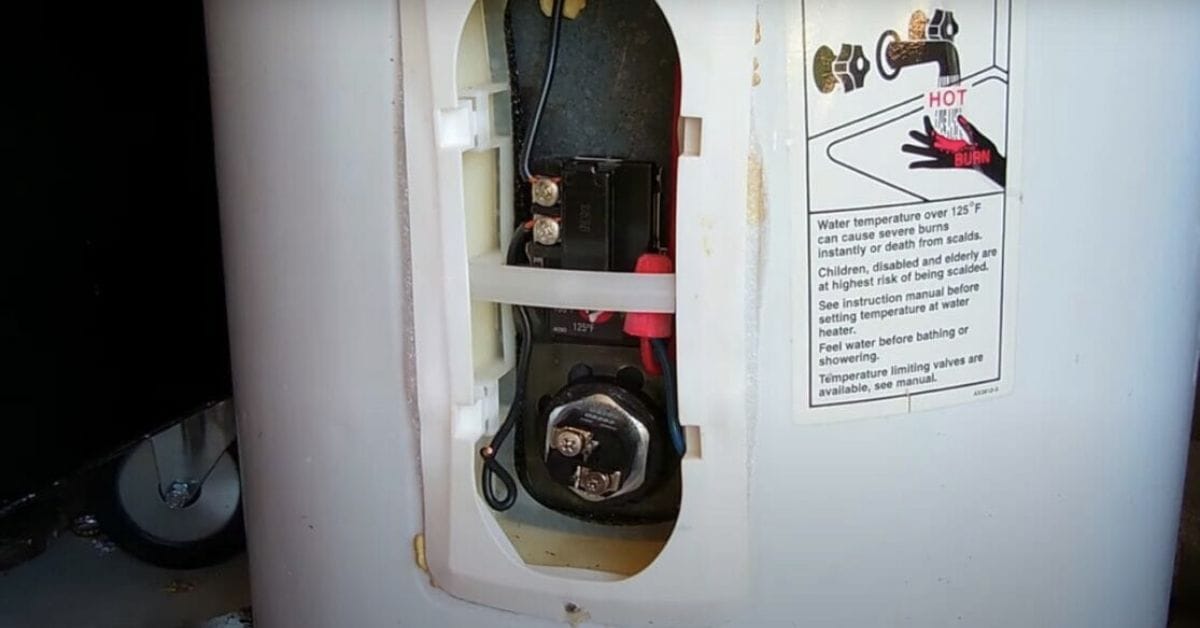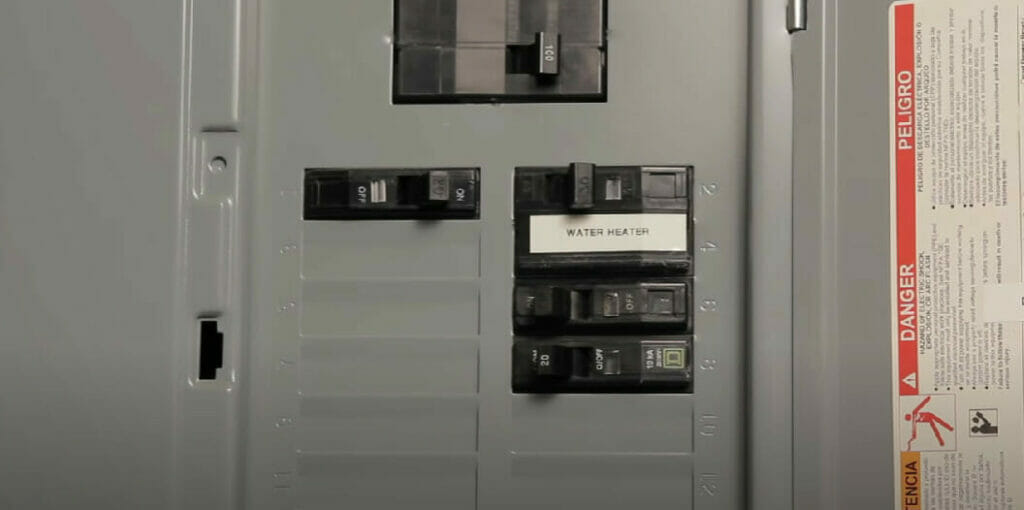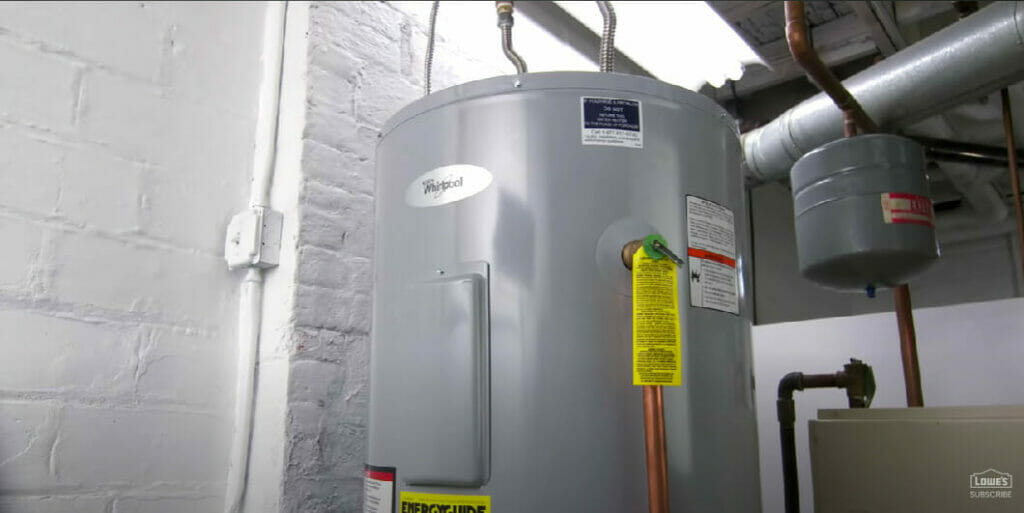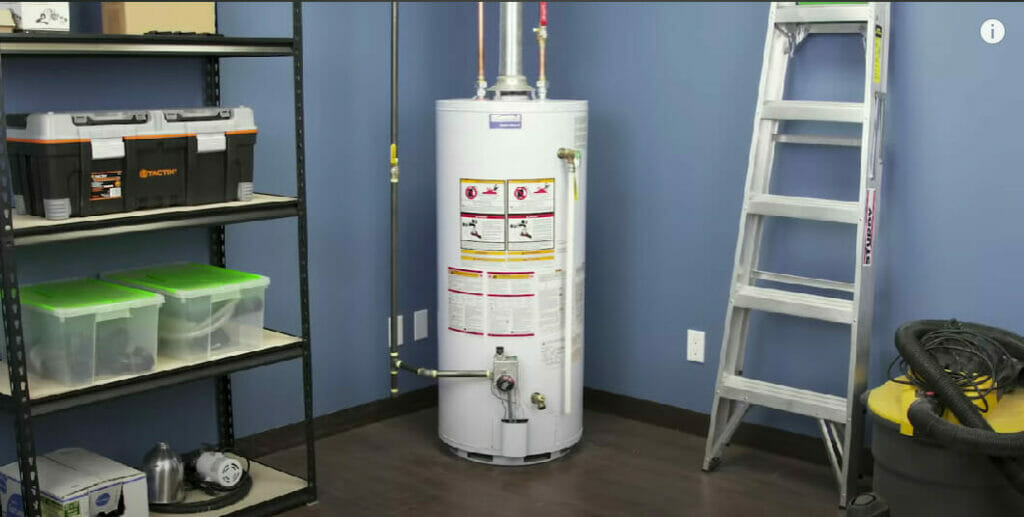What Size Breaker for Hot Water Heater: Guide

Choosing the right size breaker for your hot water heater is like picking the perfect tool for a home renovation—it’s got to be just right. I’ve seen the chaos of tripped circuits and cold showers, and trust me, you don’t want that.
In general, electric water heaters require a dedicated 30-amp breaker. The size of the breaker you need will depend on several factors, such as the wattage of your water heater, the type of wiring you have in your home, and the circuit breaker panel’s amperage rating.
By the end of this article, you’ll be armed with the knowledge to choose the perfect breaker for your water heating needs confidently.
Understanding the Correct Breaker Size for Hot Water Heaters

Think of your hot water heater as an athlete—it needs the right gear to perform at its best. Similarly, Choosing the Correct Amperage is vital for peak performance and safety.
Your hot water heater’s label is your treasure map—it shows the wattage and voltage needed for that baby to run smoothly.
For every 1,000 watts of power, you’ll use a 10 amp breaker, but hey, don’t take my word for it; keep on your toes and always check the manufacturer’s recommendations.
Onto some numbers that’ll make you feel like a pro:
| Heater Wattage | Breaker Size |
|---|---|
| Up to 3,000W | 30A |
| 3,000W – 4,500W | 30A – 40A |
| More than 4,500W | 40A – 60A |
Your breaker is the coach keeping everything in line and ensuring you’re always in hot water—when you want to be. Keep your eyes on the prize and your mind on the details, and you’ll have a water heater setup that’s fit for the majors.
Key Factors Influencing Breaker Size for Hot Water Heaters
When determining the right breaker size for your water heater, there are a few factors that you should take into account. Let me break it down for you.
- Heater’s wattage. This is the amount of electrical energy your heater needs to do its job. Generally, you’ll find the wattage listed on the heater or in the manual. But here’s a pro tip: don’t just match the breaker size directly to the wattage. You’ve got to give it some breathing room.

- Amperage draw of your heater. This one’s critical. Amperage, or current draw, is like the appetite of your heater—the more it draws, the bigger the breaker you’ll need. And remember, we’re not eyeballing these numbers. Use your heater’s amperage and multiply by 125% to stay within the safe zone, as the National Electric Code (NEC) recommends.

- Distance between the heater and the breaker panel. A longer distance can mean more resistance, and that can call for adjustments to the breaker size to compensate.
- Wire gauge. You must match that wire size to the breaker to prevent overheating issues. That’s a safety non-negotiable.
- Demand for household appliances. Your home’s electrical system is like a team. Every player—the dishwasher, dryer, you name it—must be accounted for to prevent system overload.
Remember these factors when you’re sizing up the situation for your hot water heater. It’s all about ensuring that everything runs smoothly and safely.
Electric Water Heaters: Voltage and Amperage Basics

When I first started dealing with electric water heaters in my home renovation projects, I quickly learned the importance of understanding voltage and amperage. These two are crucial in ensuring your water heater runs efficiently and safely.
Most electric water heaters in homes use 240 volts. This high voltage is key for quick heating, but what’s interesting is it doesn’t necessarily mean higher energy consumption. In fact, with the right setup, these heaters can be surprisingly energy-efficient.
Now, onto amperage – this is the real game-changer. The current draw, or amperage, determines the breaker size you’ll need.
It’s like finding the right size pipe for water flow; too small, and you risk a burst, too big, and inefficient. Heaters typically require 30 to 40 amps, which varies based on the unit’s wattage.
When you nail the perfect breaker size, it’s one less thing to worry about – and we all deserve that peace of mind, especially after a long day’s work.
Calculating the Right Breaker Size: A Step-by-Step Guide
Let’s dive into how you can calculate the correct breaker size for your hot water heater to ensure everything runs smoothly. Remember, safety first, so make sure you’re following these steps meticulously.
Step 1: Consult the Heater’s Nameplate

Take a gander at your water heater’s nameplate. This isn’t just any old sticker; it’s the jackpot of information. You’ll find the voltage and wattage requirements here, which are crucial for our next steps.
Step 2: Perform the Basic Calculation
For a typical residential electric water heater, the math is straightforward. Divide the total wattage listed on your nameplate by the voltage of your system (usually 240 volts). Let’s say your heater is rocking 4,500 watts; you’d crunch those numbers like so:
4,775 watts ÷ 240 volts = 19.90 amps
Step 3: Account for the Power Surge
Did I lose you there? Hang tight and follow along – this is the current your hot water heater will draw. But hey, we’re not done yet. Because every now and then, your water heater will wake up with a jolt of power, we need to calculate for that initial surge. The National Electrical Code (NEC) recommends a 125% safety margin, so let’s multiply our current by 1.25:
19.90 amps × 1.25 = 24.87 amps
Step 4: Round Up to the Nearest Breaker Size
As we don’t have a 24.87-amp breaker, round up to the nearest standard breaker size, 25 or 30 amps.
I’d lean towards 30 amps to give extra room – you don’t want your breaker tripping every time you crave a hot shower.
Step 5: Consult a Professional Electrician
Finally, once you’ve got your number, it’s wise to chat with a professional electrician. These champs will ensure everything’s up to code and can handle any unexpected quirks of your home’s electrical system.
Safety and accuracy are key in these calculations to ensure your hot water heater operates efficiently and safely.
Common Mistakes in Selecting Breaker Size for Water Heaters
I’ve seen homeowners make a few common mistakes when selecting the right breaker size for their water heaters; trust me, you’ll want to avoid these.
Mistake 1: Ignoring Manufacturer’s Recommendations
Your water heater has specifics for a reason, and playing it by ear just doesn’t cut it. Manufacturers provide crucial details about the required amperage, and this isn’t just a suggestion – it’s the golden rule!
Mistake 2: Underestimating the Initial Power Surge
When a water heater kicks in, it can draw much more current than during normal operation. So, if you don’t account for this, you might be setting yourself up for a trip to the breaker box every time you’re hankering for a hot shower.
Mistake 3: Overlooking Professional Advice
Sure, you might feel savvy with that wrench in your hand, but an electrician’s expertise can save you from the pitfalls of DIY guesswork. They’re the pros who know the ins and outs of electrical codes and can guide you to the perfect fit for your system’s needs.
Mistake 4: Mismatching Wire Size and Breaker Amperage
The wire size must match the breaker’s amperage rating to handle the load safely. If the wire is too small, it could overheat, potentially leading to a fire hazard.
So take notes, double-check your specs, and get a professional in your corner when in doubt. They’ll quietly have your hot water flowing safely and steadily with the right breaker size in the background.
References
Organizations:
- National Fire Protection Association (NFPA). https://www.nfpa.org/en
- Underwriters Laboratories (UL). https://www.ul.com/solutions
- Institute of Electrical and Electronics Engineers (IEEE). https://www.ieee.org/
- American Society of Heating, Refrigerating, and Air-Conditioning Engineers (ASHRAE). https://www.ashrae.org/
Books:
- “Electrical Wiring Residential” by Ray C. Mullin and Phil Simmons. https://www.barnesandnoble.com/w/electrical-wiring-residential-ray-c-mullin/1116778103
- “Wiring Simplified: Based on the 2020 National Electrical Code® (NEC)” by Frederic P. Hartwell and Herbert P. Richter. https://www-origin.abebooks.com/servlet/BookDetailsPL?bi=31448059686
- “The Homeowner’s DIY Guide to Electrical Wiring” by David Herres. https://www.barnesandnoble.com/w/the-homeowners-diy-guide-to-electrical-wiring-david-herres/1120021073
- “Electrical Safety Code Manual: A Plain Language Guide to National Electrical Code, OSHA and NFPA 70E” by Kimberley Keller. https://archive.org/details/electricalsafety0000kell
Websites and Online Resources:
- Home Depot’s Electrical Section. https://www.homedepot.com/b/Electrical/N-5yc1vZarcd
- Lowe’s Home Improvement Electrical Guides. https://www.lowes.com/nl/diy-projects-and-ideas/buying-guide/electrical
- Electrical Contractor Magazine (ECMag). https://www.ecmag.com/
Video References:
ehowathomechannel
Lowe’s Home Improvement
AMRE Supply

“Just remember, it’s always better to choose a breaker that’s 10 to 20 amps stronger than the suggested minimum. That way, you’re on the safe side!”
I was taught that for water heaters, the breaker has to be sized to protect the water heater, not the wiring. Meaning that even of you used 8 gauge wire for a 4500 watt water heater, you would not use a 40 amp breaker, but should use a 25 amp. That would mean not to use a 30 amp breaker on 10 gauge for a 4500 watt water heater.
Perhaps I was taught wrong, but my understanding for thr premise of this rule is that if a 4500 watt (@240v) max heater draws more than 18.75 amps, then there is something wrong with the heater, and you want the breaker to trip. If you have a 40 amp breaker, the over current condition in the heater could become disastrous. A 30 amp breaker presents the same concern for an 18.75 amp heater (23.4375 for the breaker @ 125%), just with a little less too much capacity.